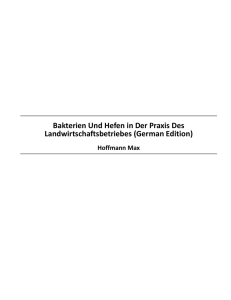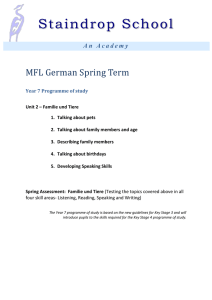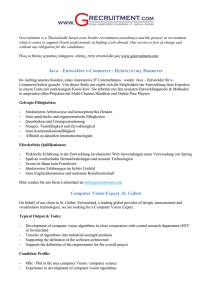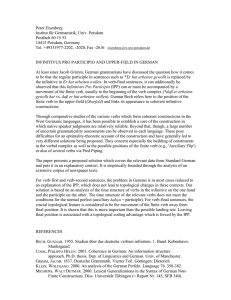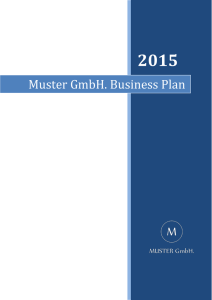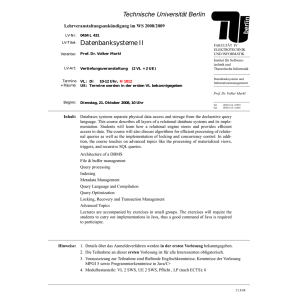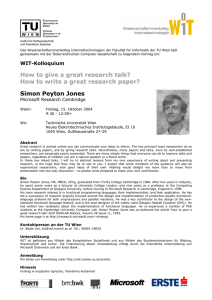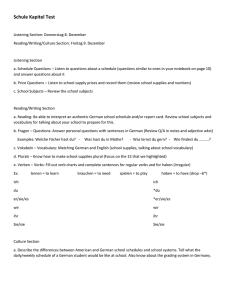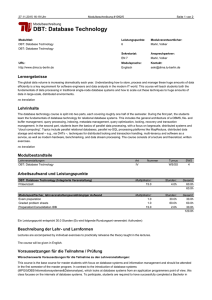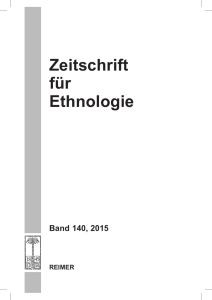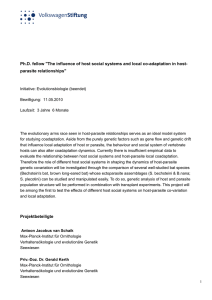pdf Syllabus - Rutgers German
Werbung
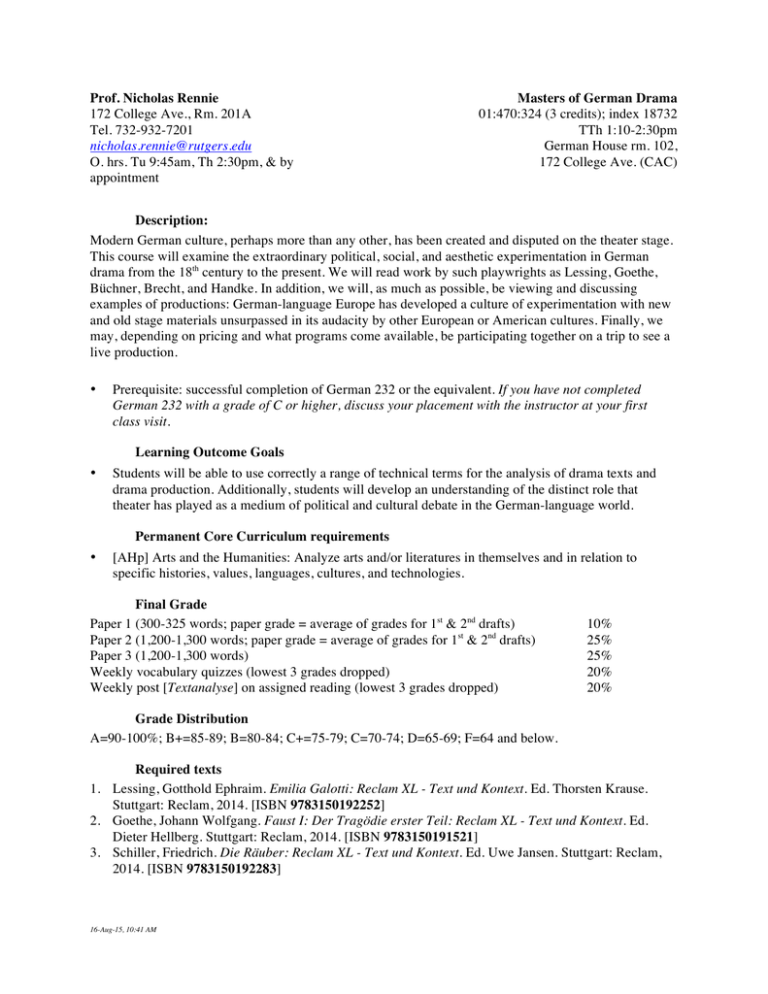
Prof. Nicholas Rennie 172 College Ave., Rm. 201A Tel. 732-932-7201 [email protected] O. hrs. Tu 9:45am, Th 2:30pm, & by appointment Masters of German Drama 01:470:324 (3 credits); index 18732 TTh 1:10-2:30pm German House rm. 102, 172 College Ave. (CAC) Description: Modern German culture, perhaps more than any other, has been created and disputed on the theater stage. This course will examine the extraordinary political, social, and aesthetic experimentation in German drama from the 18th century to the present. We will read work by such playwrights as Lessing, Goethe, Büchner, Brecht, and Handke. In addition, we will, as much as possible, be viewing and discussing examples of productions: German-language Europe has developed a culture of experimentation with new and old stage materials unsurpassed in its audacity by other European or American cultures. Finally, we may, depending on pricing and what programs come available, be participating together on a trip to see a live production. • Prerequisite: successful completion of German 232 or the equivalent. If you have not completed German 232 with a grade of C or higher, discuss your placement with the instructor at your first class visit. Learning Outcome Goals • Students will be able to use correctly a range of technical terms for the analysis of drama texts and drama production. Additionally, students will develop an understanding of the distinct role that theater has played as a medium of political and cultural debate in the German-language world. Permanent Core Curriculum requirements • [AHp] Arts and the Humanities: Analyze arts and/or literatures in themselves and in relation to specific histories, values, languages, cultures, and technologies. Final Grade Paper 1 (300-325 words; paper grade = average of grades for 1st & 2nd drafts) Paper 2 (1,200-1,300 words; paper grade = average of grades for 1st & 2nd drafts) Paper 3 (1,200-1,300 words) Weekly vocabulary quizzes (lowest 3 grades dropped) Weekly post [Textanalyse] on assigned reading (lowest 3 grades dropped) 10% 25% 25% 20% 20% Grade Distribution A=90-100%; B+=85-89; B=80-84; C+=75-79; C=70-74; D=65-69; F=64 and below. Required texts 1. Lessing, Gotthold Ephraim. Emilia Galotti: Reclam XL - Text und Kontext. Ed. Thorsten Krause. Stuttgart: Reclam, 2014. [ISBN 9783150192252] 2. Goethe, Johann Wolfgang. Faust I: Der Tragödie erster Teil: Reclam XL - Text und Kontext. Ed. Dieter Hellberg. Stuttgart: Reclam, 2014. [ISBN 9783150191521] 3. Schiller, Friedrich. Die Räuber: Reclam XL - Text und Kontext. Ed. Uwe Jansen. Stuttgart: Reclam, 2014. [ISBN 9783150192283] 16-Aug-15, 10:41 AM 4. Büchner, Georg. Woyzeck: Reclam XL - Text und Kontext. Ed. Heike Wirthwein. Stuttgart: Reclam, 2013. [ISBN 9783150190180] 5. Handke, Peter. Publikumsbeschimpfung und andere Sprechstücke. Frankfurt am Main: Suhrkamp, 2006. [ISBN 9783518101773] In order for us to discuss the weekly readings (both those available in book version, and those available at the course Sakai / Resources page as pdf-files), each seminar participant is required to bring his or her copy of the assigned reading(s) to class in order to receive full credit for attendance (see “Attendance” below). Unless you can both reliably and quickly navigate to the relevant page on an electronic device that you bring to class (and, ideally, have a mark-up feature as well to highlight specific passages or add marginal notes), you will need to print out each pdf-file and bring it in hard copy. In either case, be sure to buy and/or download (and print) all available assigned readings early on, when you still have time to resolve any technical issues that might otherwise prevent your arriving prepared for a particular class. Course Sakai website A website for this course is available to enrolled students at sakai.rutgers.edu (login and select the tab 2015-09 Masters of German Drama 470:324). A copy of the syllabus is available at the website, as are pdf-copies of a number of the readings (under Resources), assignment links and information, updated vocabulary lists and other materials. You will need to login on the site regularly to receive information and post assignments. Attendance All students must attend regularly and arrive prepared. If you expect to miss one or two classes, please use the University absence reporting website https://sims.rutgers.edu/ssra/ to indicate the date and reason for your absence. An email is automatically sent to me. Those who miss more than two class sessions without a compelling excuse should expect a one-step reduction in the course grade (i.e. an A becomes a B+, a B+ becomes a B). Every additional three absences may entail a further one-step grade-reduction. Three late arrivals count as one absence. Failure to bring copies of the assigned readings to three classes likewise counts as one absence. Note: It is the responsibility of students who have been absent (for any reason) to find out what they have missed and obtain materials that may have been handed out. Disability Support Services Students who may be requesting accommodations due to disabilities are encouraged to familiarize themselves with procedures and policies regarding disability support services at the following website: http://disabilityservices.rutgers.edu/. It is recommended that students seeking accommodations begin filing paperwork as soon as possible as the documentation review process may take up to 30 business days. Students are encouraged to speak with teachers about these issues at the beginning of the term. All such conversations will be kept strictly confidential. Academic Integrity Violations of academic integrity are an extremely serious matter, and can lead to a student’s failing the course and being referred to the University’s Office of Student Conduct for disciplinary action. When referring to ideas other than your own, always acknowledge your sources clearly and completely, whether you are quoting or paraphrasing. Note also that use of online translation services is not permitted as a tool for generating work that you submit for course credit. Please see the University’s policies on academic integrity at http://academicintegrity.rutgers.edu/, and discuss with your instructor any questions you may have about this and related issues. 16-Aug-15, 10:41 AM 2 Electronic devices in class Use of electronic devices in class other than for study of the class topic (e.g. taking notes or consulting an assigned text in electronic form) is strictly forbidden. Those seen using such devices for other purposes will be asked to leave immediately. Their dismissal will count as an absence and may result in a lowering of their overall grade. Assignments Class preparation and discussion • All students are expected to take part actively in class discussion, and to do so in German. To this end, you are expected to have read the entire assigned reading for the day, to have looked up any words that may be unfamiliar, to arrive able to convey the basic gist of the reading, and to be prepared to present and discuss (without reading from a prepared text) the basic issue(s) that you raised in the week’s discussion board. • To help you prepare, and to help you avoid some of the frustration of fussing over every new vocabulary word in a challenging literary text, I am making English-language translations of some materials available at the course Sakai / Resources page. These materials do not replace the assigned texts. Questions and discussions of the readings will be in German, and will require and assume that you have read the texts in the original. Take-home papers and the online discussionboard assignments will likewise require that you read and cite from the assigned texts (which you can do much more quickly and effectively if you have been working with these texts, underlining and commenting in the margins as you go). Take-home Paper Assignments (Aufsätze) • For a general description (which I give students in various courses) of my expectations for papers, go to the course Sakai / Resources page and download Papers and presentations General thoughts Rennie.pdf. • Papers for this course must be written in German using proper letters and diacritical signs (e.g. draußen rather than draussen, schön rather than schoen – ask well in advance if you don’t know how to do this on your computer). You are encouraged to use a word-processing program, such as MS Word or the Google Docs/Google Drive word processor, that lets you set spellcheck and autocorrect to German, in order to help you catch and fix errors. (By the same token, do be sure not to have autocorrect selected in another language, such as English, since this will result in countless Verschlimmbesserungen of your German!) • You will be assigned questions to which your essays need to respond analytically. Each essay must present an argument based on your interpretation of the text and any relevant visual materials, and should avoid plot summary or biographical information about the author except where clearly necessary to make a point about the text. You should present a clear thesis (within the first 2-5 sentences of the essay), and develop and substantiate this thesis in the following paragraphs with frequent reference to your source materials. You should include consideration of (and reflect basic knowledge communicated in) any and all relevant discussions from class. Be sure to take notes during discussions and mark up your assigned texts as you read them (or use sticky tabs, or whatever works for you), so that when the time comes to write your paper, you can more quickly find the materials you need. • You absolutely must – must! – cite the page numbers for every passage cited from an assigned reading or other published text. In the case of a poem or play, you can substitute act, scene and line numbers for page numbers. Likewise, any citations from video materials must include precise time indications, such as the parenthetical reference “(1:03:13 – 1:06:56)” to indicate an excerpt from early in the second hour of a particular film. Rule of thumb: whenever anything is cited in your paper, I or another reader should easily be able to locate the exact source. 16-Aug-15, 10:41 AM 3 Each of the first two assignments will be submitted once, returned, corrected for content and style as well as for grammar, and submitted a second time. (Deadlines appear in the course’s Sakai schedule, as well as at the Sakai Assignments page.) Your first draft will be returned to you with comments and a grade. Your revised draft will receive another grade, and the average of the two will generate your assignment’s final grade. The third and final paper assignment will be submitted just once. No late paper assignments will be accepted unless you have arranged in advance for an extension. Use of an online translation engine will be considered cheating! Weekly vocabulary quizzes • Every field and sub-field has its own vocabulary. To make sure we all have the tools we need to analyze the materials in this course, I’ve compiled and will revise a course vocabulary list from week to week. To see the current list, click on the link Vokabeln in the left margin of the course Sakai site. The vocabulary list for any given week will always be finalized by the end of the prior Saturday. • As you already know, repetition is the key to learning vocabulary and using it fluidly and correctly. Starting on September 17th, each Thursday class will begin with a short vocabulary quiz. The quiz will be based on the format of the vocabulary list. Example: if the prompt is “the stage,” you would translate the word, with the article and the nominate, genitive and accusative, into German: “die Bühne, der Bühne, die Bühnen.“ In the case of strong verbs, you would include the infinitive, simple past, and past perfect. In some cases I’ll ask you to memorize a phrase (e.g. “the drama is about a woman…” = “das Drama handelt von einer Frau...“). • These quizzes should virtually ensure you an “A” for 20% of the final grade. The key is that you have to make a little time to memorize and review the vocabulary itself, of course. There won’t be any trick questions. However, do keep in mind that you are not just learning vocabulary in order to have it in mind during one class: the material covered by quizzes is cumulative, meaning that the list gets a little longer with each week. • The lowest three grades will be dropped. If for any reason you miss or do badly on a couple of quizzes, don’t panic – just make sure you prepare for the next one! Weekly online posts • Starting Monday, September 14th, you will need to post to Sakai / Discussion & Private Messages your analysis, in German, of a specific passage or issue in one or more dramas assigned for that week (i.e. for the Tuesday and Thursday immediately following the deadline). • Required length: 150-200 words. • You must cite (always including page and/or act, scene, line numbers) and engage analytically with specific passages from the German-language text. General comments about a play will not earn you points for this assignment, nor will you receive full credit for remarks that focus on specifics but fail to cite the relevant page or act/scene/line numbers. • For thoughts about how to put together ideas about a literary text, go to the course Sakai / Resources page and download Papers and presentations General thoughts Rennie.pdf. • 16-Aug-15, 10:41 AM 4 Semesterplan – Änderungen vorbehalten • • Die Einreichetermine für die Aufsätze finden Sie bei Sakai auf der Webseite für diesen Kurs. Alle folgenden Texte, insofern sie oben nicht unter den „required texts“ aufgelistet sind, müssen von der Sakai Resources-Seite heruntergeladen werden. Sitzung 1, am 1.9. • • Einführung Sitzung 2, am 3.9. • Gotthold Ephraim Lessing (1729-1781), Emilia Galotti (erschienen 1767; Uraufführung 1772): Erster Aufzug Sitzung 8, am 29.9. Sitzung 3, am 10.9. • • Lessing, Emilia Galotti, Zweiter Aufzug Peter Demetz, Introduction: Lessing, Gotthold Ephraim. Nathan the Wise, Minna von Barnhelm, and Other Plays and Writings, ed. Peter Demetz (New York: Continuum, 1991) xxi-xxvii. [Lessing - Intro to Lessing - Peter Demetz - Hannah Arendt.pdf] Einträge zu „Schiller,“ „die Räuber“ und „Sturm und Drang“ in: Garland, Henry B., and Mary Garland. The Oxford Companion to German Literature. 3rd ed. (Oxford; New York: Oxford University Press, 1997). [Schiller Die Räuber and Sturm und Drang Oxford Companion.PDF] • Schiller, Die Räuber, Zweiter Akt Sitzung 9, am 1.10. • Schiller, Die Räuber, Dritter Akt Sitzung 10, am 6.10. • Schiller, Die Räuber, Vierter Akt Sitzung 11, am 8.10. Sitzung 4, am 15.9. • • Schiller, Die Räuber, Fünfter Akt Lessing, Emilia Galotti, Dritter Aufzug Sitzung 12, am 13.10. Sitzung 5, am 17.9. (ACHTUNG – 1. VOKABELPRÜFUNG HEUTE!) • • Lessing, Emilia Galotti, Fünfter Aufzug Johann Wolfgang von Goethe (17491832), Faust I (ca. 1772-1806; vollständiges Drama – Faust I & II – veröffentlicht 1832; Uraufführung von Teil I [einzelne Szenen]: 1819; Uraufführung von Teil II: 1854) V. [Verse] 33-807. Einträge zu „Goethe“ und „Faust“ in: Garland, Henry B., and Mary Garland. The Oxford Companion to German Literature. 3rd ed. (Oxford; New York: Oxford University Press, 1997). [Goethe Faust Oxford Companion.PDF] Sitzung 7, am 24.9. Sitzung 13, am 15.10. Lessing, Emilia Galotti, Vierter Aufzug Hellmut H. Rennert, Introduction: Essays on Twentieth-Century German Drama and Theater: An American Reception, 1977-1999 (New York; Oxford: P. Lang, 2004) 1-17. [Rennert, Hellmut H. - Essays on 20th-Century German Drama and Theater - Intro.pdf] • • Sitzung 6, am 22.9. • • Friedrich Schiller (1759-1805), Die Räuber (anonym veröffentlicht 1781; Uraufführung 1782), Erster Akt • Sitzung 14, am 20.10. • 16-Aug-15, 10:41 AM Goethe, Faust I, V. 1177-1867. Goethe, Faust I, V. 2051-2677. 5 Sitzung 15, am 22.10. • Goethe, Faust I, V. 2678-3024; 34133520; 4405-4612. Sitzung 22, am 17.11. • Brecht, theoretische Schriften Sitzung 23, am 19.11. Sitzung 16, am 27.10 • • Goethe, Faust II, V. 11511-12111. Sitzung 17, am 29.10. • • Georg Büchner (1813-1837), Woyzeck (1836-37; Erstveröffentlichung 1879; Uraufführung 1913) Michael Patterson, Introduction to Woyzeck: Büchner, Georg, The Complete Plays: Together with Other Prose Writings, ed. Michael Patterson (London: Methuen, 1987) 153-176 [Büchner Woyzeck English Patterson Intro.PDF] • Sitzung 24, am 24.11. Sitzung 18, am 3.11. • Büchner, Woyzeck • Sitzung 19, am 5.11. • Büchner, Woyzeck • Sitzung 20, am 10.11. • Büchner, Woyzeck Bertolt Brecht (1898-1956), Auszüge aus Schriften zum Theater: o „Anmerkungen zur Oper ‘Aufstieg und Fall der Stadt Mahagonny’”, S. 1004-1016 im ursprünglichen Text (S. 22-28 in der PDF-Datei); o „ – aber Neuerungen!” + Schema zum dramatischen und epischen Theater, S. 1008-1011 im ursprünglichen Text (S. 2425 in der PDF-Datei); o „[Kritik der Poetik des Aristoteles]“, S. 240-242 im ursprünglich Text (S. 4-5 in der PDF-Datei); o „[Notizen über V-Effekte“], S. 364-370 im ursprünglichen Text (S. 13-16 in der PDF-Datei) 16-Aug-15, 10:41 AM Weiss, Die Verfolgung und Ermordung Jean Paul Marats, S. 30-50 [Szenen 1117]. Film: Peter Brook (1925-), Marat/Sade (1967), Auszüge. Sitzung 25, am 1.12. • Sitzung 21, am 12.11. • Peter Weiss (1916-1982), “Author’s Note on the Historical Background to the Play,” in: Marat/Sade, tr. Geoffrey Skelton and Adrian Mitchell, S. 105109. (Diese Anmerkungen finden Sie auch in der deutschen Version des Textes, auf S. 119-123.) Weiss, Die Verfolgung und Ermordung Jean Paul Marats, dargestellt durch die Schauspielgruppe des Hospizes zu Charenton unter Anleitung des Herrn de Sade (erschienen und Uraufführung 1964, vom Autor revidierte Fassung 1965), S. 9-30 [Szenen 1-10]. Weiss, Die Verfolgung und Ermordung Jean Paul Marats Sitzung 26, am 3.12. • • Herzfeld-Sander, Margaret. Introduction to: Contemporary German Plays II. New York: Continuum, 2002, vii-xv. Peter Handke (1942- ), Publikumsbeschimpfung (Uraufführung 1966) Sitzung 27, am 8.12. • Handke, Publikumsbeschimpfung Sitzung 28, am 10.12. • Abschließende Diskussion 6
